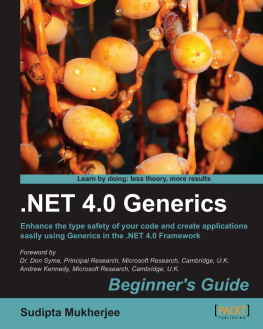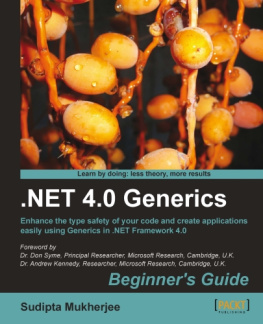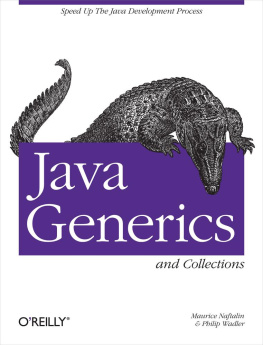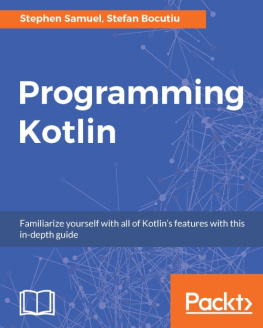Foreword
It is my pleasure to write the foreword to a book which will introduce you to the world of generic programming with C# and other .NET languages. You will be able to learn a lot from this book, as it introduces you to the elegant power of generic programming in C#. Through it, you will become a better C# programmer, and a better programmer in all future languages you might choose to use.
It is now almost 10 years since .NET Generics was first described in publications from Microsoft Research, Cambridge, a project I was able to lead and contribute to, and six years since it was released in product form in C# 2.0. In this foreword, I would like to take a moment to review the importance of .NET Generics in the history of programming languages, and the way it continues to inspire a new generation of programmers.
When we began the design of C# and .NET Generics, generic programming was not new. However, it was considered to be outside the mainstream, and attempts to change that with C++ templates and proposals for Java Generics were proving highly problematic for practitioners. At Microsoft Research, we pride ourselves on solving problems at their core. The three defining core features of .NET Generics as we designed them were efficient generics over value types with code generation and sharing managed by the virtual machine, reified run-time types, and language neutrality.
These technical features are now widely acknowledged to represent the "right" fundamental design choices for programming language infrastructure. They are not easy to design or build, and they are not easy to deliver, and when Microsoft Research embarked on this project, we believe we put the .NET platform many years ahead of its rivals. The entire credit goes to Microsoft and people such as Bill Gates, Eric Rudder, and Anders Hejlsberg for taking the plunge to push this into our range of programming languages. However, without the prototyping, research, engineering, and incessant advocacy by Microsoft Research, C# and .NET Generics would never be in their current form.
Let's take some time to examine why this was important. First, .NET Generics represents the moment where strongly typed and functional programming entered the mainstream..NET Generics enabled C# to become more functional (through LINQ, Lambdas, and generic collections), and it enabled a new class of strongly typed, fully functional .NET languages (such as F#) to thrive. Further, .NET Generics also enabled new key programming techniques, such as Async programming in F# 2.0 and C# 5.0, and Rx programming for reactive systems. Even though you may not realize it, you'll have learned a lot of functional programming by the end of this book.
Next, .NET Generics categorically proved that strongly typed object-oriented programming can integrate seamlessly with generic programming. It is hard to describe the extent to which .NET Generics managed to defeat the "object fundamentalists" of the 1990s (who want a world where there is nothing but classes). These people, many still occupying powerful positions in the software industry, seemed satisfied with a world where programmers are less productive, and programs less efficient, in the name of orthodoxy. Today, no practicing programmer or language designer with experience of .NET Generics would design a strongly typed programming language that does not include Generics. Further, almost every .NET API now features the use of .NET Generics, and it has become an essential weapon in the programmer's toolkit for solving many problems.
Finally, and for me most importantly, .NET Generics represents the victory of pragmatic beauty over pragmatic ugliness. In the eyes of many, alternative solutions to the problem of generic programming such as Java's "erasure" of Generics are simply unpleasant "hacks". This leads to reduced productivity when using those languages. In contrast, .NET Generics is perhaps the most smoothly integrated advanced programming language feature ever constructed. It integrates with reflection, .NET NGEN pre-compilation, debugging, and run-time code generation. I've had many people e-mail me to say that .NET Generics is their favorite programming language feature. That is what language research is all about.
I trust you will learn a great deal from this book, and enjoy the productivity that comes from C#, and .NET languages such as F#.
Dr. Don Syme Principal Research, Microsoft Research, Cambridge, U.K.
Generic types are more than just lists of T. Functional programmers have known this for a long time. C++ programmers who use templates knew this too. But 10 years ago when Don Syme and I first designed and prototyped the Generics feature of the .NET run-time, most mainstream developers were constrained by the rudimentary type systems of languages such as Visual Basic and Java, writing type-generic code only by resorting to casting tricks or worse. In that space, it's hard to conceive of myriad uses of generic types beyond lists and simple collections, and it's fair to say that there was some resistance to our design! Fortunately, some forward thinkers in Microsoft's .NET run-time team regarded Generics in managed languages as more than an academic indulgence, and committed substantial resources to completing a first-class implementation of Generics that is deeply embedded in the run-time languages and tools.
We've come a long way in 10 years! Managed code frameworks make liberal use of generic types, ranging from obvious collection types such as List and Dictionary, through `action' types such as Func and IEnumerable, to more specialized use of Generics such as Lazy initialization. Blogs and online forums are full of discussions on sophisticated topics such as variance and circular constraints. And if it weren't for Generics, it's hard to see how newer language features such as LINQ, or even complete languages such as F#, could have got off the ground.












